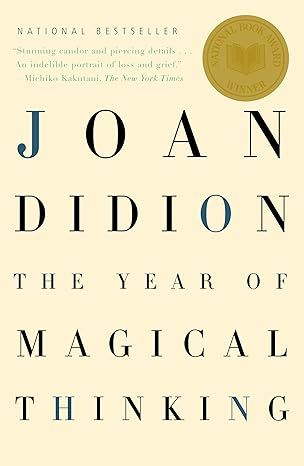The Year of Magical Thinking: National Book Award Winner
4.4
-
11,748 ratings
NEW YORK TIMES BESTSELLER • NATIONAL BOOK AWARD WINNER • From one of America’s iconic writers, a stunning book of electric honesty and passion that explores an intensely personal yet universal experience: a portrait of a marriage—and a life, in good times and bad—that will speak to anyone who has ever loved a husband or wife or child.
Several days before Christmas 2003, John Gregory Dunne and Joan Didion saw their only daughter, Quintana, fall ill with what seemed at first flu, then pneumonia, then complete septic shock. She was put into an induced coma and placed on life support. Days later—the night before New Year’s Eve—the Dunnes were just sitting down to dinner after visiting the hospital when John Gregory Dunne suffered a massive and fatal coronary. In a second, this close, symbiotic partnership of forty years was over. Four weeks later, their daughter pulled through. Two months after that, arriving at LAX, she collapsed and underwent six hours of brain surgery at UCLA Medical Center to relieve a massive hematoma.
This powerful book is Didion’ s attempt to make sense of the “weeks and then months that cut loose any fixed idea I ever had about death, about illness ... about marriage and children and memory ... about the shallowness of sanity, about life itself.
Kindle
$13.99
Available instantly
Audiobook
$0.00
with membership trial
Hardcover
$14.69
Paperback
$10.29
Ships from
Amazon.com
Payment
Secure transaction
ISBN-10
1400078431
ISBN-13
978-1400078431
Print length
227 pages
Language
English
Publisher
Vintage
Publication date
February 12, 2007
Dimensions
5.22 x 0.62 x 7.99 inches
Item weight
7.8 ounces
Popular Highlights in this book
Grief is different. Grief has no distance. Grief comes in waves, paroxysms, sudden apprehensions that weaken the knees and blind the eyes and obliterate the dailiness of life.
Highlighted by 5,307 Kindle readers
Until now I had been able only to grieve, not mourn. Grief was passive. Grief happened. Mourning, the act of dealing with grief, required attention.
Highlighted by 4,047 Kindle readers
Grief turns out to be a place none of us know until we reach it.
Highlighted by 3,251 Kindle readers
Product details
ASIN :
B000OI0FS0
File size :
1330 KB
Text-to-speech :
Enabled
Screen reader :
Supported
Enhanced typesetting :
Enabled
X-Ray :
Enabled
Word wise :
Enabled
Award Winners:
Editorial Reviews
“Thrilling . . . a living, sharp, and memorable book. . . . An exact, candid, and penetrating account of personal terror and bereavement . . . sometimes quite funny because it dares to tell the truth.” —Robert Pinsky, The New York Times Book Review
“Stunning candor and piercing details. . . . An indelible portrait of loss and grief.” —Michiko Kakutani, The New York Times
“I can’t think of a book we need more than hers. . . . I can’t imagine dying without this book.” —John Leonard, New York Review of Books
“Achingly beautiful. . . . We have come to admire and love Didion for her preternatural poise, unrivaled eye for absurdity, and Orwellian distaste for cant. It is thus a difficult, moving, and extraordinarily poignant experience to watch her direct such scrutiny inward.” —Gideon Lewis-Kraus, Los Angeles Times
“An act of consummate literary bravery, a writer known for her clarity allowing us to watch her mind as it becomes clouded with grief. . . . It also skips backward in time [to] call up a shimmering portrait of her unique marriage. . . . To make her grief real, Didion shows us what she has lost.” —Lev Grossman, Time
Sample
Chapter 1
Life changes fast.
Life changes in the instant.
You sit down to dinner and life as you know it ends.
The question of self-pity.
Those were the first words I wrote after it happened. The computer dating on the Microsoft Word file (“Notes on change.doc”) reads “May 20, 2004, 11:11 p.m.,” but that would have been a case of my opening the file and reflexively pressing save when I closed it. I had made no changes to that file in May. I had made no changes to that file since I wrote the words, in January 2004, a day or two or three after the fact.
For a long time I wrote nothing else.
Life changes in the instant.
The ordinary instant.
At some point, in the interest of remembering what seemed most striking about what had happened, I considered adding those words, “the ordinary instant.” I saw immediately that there would be no need to add the word “ordinary,” because there would be no forgetting it: the word never left my mind. It was in fact the ordinary nature of everything preceding the event that prevented me from truly believing it had happened, absorbing it, incorporating it, getting past it. I recognize now that there was nothing unusual in this: confronted with sudden disaster we all focus on how unremarkable the circumstances were in which the unthinkable occurred, the clear blue sky from which the plane fell, the routine errand that ended on the shoulder with the car in flames, the swings where the children were playing as usual when the rattlesnake struck from the ivy. “He was on his way home from work—happy, successful, healthy—and then, gone,” I read in the account of a psychiatric nurse whose husband was killed in a highway accident. In 1966 I happened to interview many people who had been living in Honolulu on the morning of December 7, 1941; without exception, these people began their accounts of Pearl Harbor by telling me what an “ordinary Sunday morning” it had been. “It was just an ordinary beautiful September day,” people still say when asked to describe the morning in New York when American Airlines 11 and United Airlines 175 got flown into the World Trade towers. Even the report of the 9/11 Commission opened on this insistently premonitory and yet still dumbstruck narrative note: “Tuesday, September 11, 2001, dawned temperate and nearly cloudless in the eastern United States.”
“And then—gone.” In the midst of life we are in death, Episcopalians say at the graveside. Later I realized that I must have repeated the details of what happened to everyone who came to the house in those first weeks, all those friends and relatives who brought food and made drinks and laid out plates on the dining room table for however many people were around at lunch or dinner time, all those who picked up the plates and froze the leftovers and ran the dishwasher and filled our (I could not yet think my) otherwise empty house even after I had gone into the bedroom (our bedroom, the one in which there still lay on a sofa a faded terrycloth XL robe bought in the 1970s at Richard Carroll in Beverly Hills) and shut the door. Those moments when I was abruptly overtaken by exhaustion are what I remember most clearly about the first days and weeks. I have no memory of telling anyone the details, but I must have done so, because everyone seemed to know them. At one point I considered the possibility that they had picked up the details of the story from one another, but immediately rejected it: the story they had was in each instance too accurate to have been passed from hand to hand. It had come from me.
Another reason I knew that the story had come from me was that no version I heard included the details I could not yet face, for example the blood on the living room floor that stayed there until José came in the next morning and cleaned it up.José. Who was part of our household. Who was supposed to be flying to Las Vegas later that day, December 31, but never went. José was crying that morning as he cleaned up the blood. When I first told him what had happened he had not understood. Clearly I was not the ideal teller of this story, something about my version had been at once too offhand and too elliptical, something in my tone had failed to convey the central fact in the situation (I would encounter the same failure later when I had to tell Quintana), but by the time José saw the blood he understood.I had picked up the abandoned syringes and ECG electrodes before he came in that morning but I could not face the blood.In outline.It is now, as I begin to write this, the afternoon of October 4, 2004.
Nine months and five days ago, at approximately nine o’clock on the evening of December 30, 2003, my husband, John Gregory Dunne, appeared to (or did) experience, at the table where he and I had just sat down to dinner in the living room of our apartment in New York, a sudden massive coronary event that caused his death. Our only child, Quintana, had been for the previous five nights unconscious in an intensive care unit at Beth Israel Medical Center’s Singer Division, at that time a hospital on East End Avenue (it closed in August 2004) more commonly known as “Beth Israel North” or “the old Doctors’ Hospital,” where what had seemed a case of December flu sufficiently severe to take her to an emergency room on Christmas morning had exploded into pneumonia and septic shock. This is my attempt to make sense of the period that followed, weeks and then months that cut loose any fixed idea I had ever had about death, about illness, about probability and luck, about good fortune and bad, about marriage and children and memory, about grief, about the ways in which people do and do not deal with the fact that life ends, about the shallowness of sanity, about life itself. I have been a writer my entire life. As a writer, even as a child, long before what I wrote began to be published, I developed a sense that meaning itself was resident in the rhythms of words and sentences and paragraphs, a technique for withholding whatever it was I thought or believed behind an increasingly impenetrable polish. The way I write is who I am, or have become, yet this is a case in which I wish I had instead of words and their rhythms a cutting room, equipped with an Avid, a digital editing system on which I could touch a key and collapse the sequence of time, show you simultaneously all the frames of memory that come to me now, let you pick the takes, the marginally different expressions, the variant readings of the same lines. This is a case in which I need more than words to find the meaning. This is a case in which I need whatever it is I think or believe to be penetrable, if only for myself. 2.December 30, 2003, a Tuesday.
We had seen Quintana in the sixth-floor ICU at Beth Israel North.We had come home.We had discussed whether to go out for dinner or eat in.I said I would build a fire, we could eat in.I built the fire, I started dinner, I asked John if he wanted a drink.I got him a Scotch and gave it to him in the living room, where he was reading in the chair by the fire where he habitually sat.
The book he was reading was by David Fromkin, a bound galley of Europe’s Last Summer: Who Started the Great War in 1914?I finished getting dinner, I set the table in the living room where, when we were home alone, we could eat within sight of the fire. I find myself stressing the fire because fires were important to us. I grew up in California, John and I lived there together for twenty-four years, in California we heated our houses by building fires. We built fires even on summer evenings, because the fog came in. Fires said we were home, we had drawn the circle, we were safe through the night. I lit the candles. John asked for a second drink before sitting down. I gave it to him. We sat down. My attention was on mixing the salad.John was talking, then he wasn’t.At one point in the seconds or minute before he stopped talking he had asked me if I had used single-malt Scotch for his second drink. I had said no, I used the same Scotch I had used for his first drink. “Good,” he had said. “I don’t know why but I don’t think you should mix them.” At another point in those seconds or that minute he had been talking about why World War One was the critical event from which the entire rest of the twentieth century flowed.I have no idea which subject we were on, the Scotch or World War One, at the instant he stopped talking.I only remember looking up. His left hand was raised and he was slumped motionless. At first I thought he was making a failed joke, an attempt to make the difficulty of the day seem manageable.I remember saying Don’t do that.
When he did not respond my first thought was that he had started to eat and choked. I remember trying to lift him far enough from the back of the chair to give him the Heimlich. I remember the sense of his weight as he fell forward, first against the table, then to the floor. In the kitchen by the telephone I had taped a card with the New York–Presbyterian ambulance numbers. I had not taped the numbers by the telephone because I anticipated a moment like this. I had taped the numbers by the telephone in case someone in the building needed an ambulance.
Someone else.
I called one of the numbers. A dispatcher asked if he was breathing. I said Just come. When the paramedics came I tried to tell them what had happened but before I could finish they had transformed the part of the living room where John lay into an emergency department. One of them (there were three, maybe four, even an hour later I could not have said) was talking to the hospital about the electrocardiogram they seemed already to be transmitting. Another was opening the first or second of what would be many syringes for injection. (Epinephrine? Lidocaine? Procainamide? The names came to mind but I had no idea from where.) I remember saying that he might have choked. This was dismissed with a finger swipe: the airway was clear. They seemed now to be using defibrillating paddles, an attempt to restore a rhythm. They got something that could have been a normal heartbeat (or I thought they did, we had all been silent, there was a sharp jump), then lost it, and started again.“He’s still fibbing,” I remember the one on the telephone saying.“V-fibbing,” John’s cardiologist said the next morning when he called from Nantucket. “They would have said ‘V-fibbing.’ V for ventricular.”Maybe they said “V-fibbing” and maybe they did not. Atrial fibrillation did not immediately or necessarily cause cardiac arrest. Ventricular did. Maybe ventricular was the given.
I remember trying to straighten out in my mind what would happen next. Since there was an ambulance crew in the living room, the next logical step would be going to the hospital. It occurred to me that the crew could decide very suddenly to go to the hospital and I would not be ready. I would not have in hand what I needed to take. I would waste time, get left behind. I found my handbag and a set of keys and a summary John’s doctor had made of his medical history. When I got back to the living room the paramedics were watching the computer monitor they had set up on the floor. I could not see the monitor so I watched their faces. I remember one glancing at the others. When the decision was made to move it happened very fast. I followed them to the elevator and asked if I could go with them. They said they were taking the gurney down first, I could go in the second ambulance. One of them waited with me for the elevator to come back up. By the time he and I got into the second ambulance the ambulance carrying the gurney was pulling away from the front of the building. The distance from our building to the part of New York–Presbyterian that used to be New York Hospital is six crosstown blocks. I have no memory of sirens. I have no memory of traffic. When we arrived at the emergency entrance to the hospital the gurney was already disappearing into the building. A man was waiting in the driveway. Everyone else in sight was wearing scrubs. He was not. “Is this the wife,” he said to the driver, then turned to me. “I’m your social worker,” he said, and I guess that is when I must have known.
I opened the door and I seen the man in the dress greens and I knew. I immediately knew.” This was what the mother of a nineteen-year-old killed by a bomb in Kirkuk said on an HBO documentary quoted by Bob Herbert in The New York Times on the morning of November 12, 2004. “But I thought that if, as long as I didn’t let him in, he couldn’t tell me. And then it—none of that would’ve happened. So he kept saying, ‘Ma’am, I need to come in.’ And I kept telling him, ‘I’m sorry, but you can’t come in.’ ”When I read this at breakfast almost eleven months after the night with the ambulance and the social worker I recognized the thinking as my own.Inside the emergency room I could see the gurney being pushed into a cubicle, propelled by more people in scrubs. Someone told me to wait in the reception area. I did. There was a line for admittance paperwork. Waiting in the line seemed the constructive thing to do. Waiting in the line said that there was still time to deal with this, I had copies of the insurance cards in my handbag, this was not a hospital I had ever negotiated—New York Hospital was the Cornell part of New York–Presbyterian, the part I knew was the Columbia part, Columbia-Presbyterian, at 168th and Broadway, twenty minutes away at best, too far in this kind of emergency—but I could make this unfamiliar hospital work, I could be useful, I could arrange the transfer to Columbia-Presbyterian once he was stabilized. I was fixed on the details of this imminent transfer to Columbia (he would need a bed with telemetry, eventually I could also get Quintana transferred to Columbia, the night she was admitted to Beth Israel North I had written on a card the beeper numbers of several Columbia doctors, one or another of them could make all this happen) when the social worker reappeared and guided me from the paperwork line into an empty room off the reception area. “You can wait here,” he said. I waited. The room was cold, or I was. I wondered how much time had passed between the time I called the ambulance and the arrival of the paramedics. It had seemed no time at all (a mote in the eye of God was the phrase that came to me in the room off the reception area) but it must have been at the minimum several minutes.
Read more
About the authors
Joan Didion
Joan Didion was born in Sacramento in 1934 and graduated from the University of California, Berkeley, in 1956. After graduation, Didion moved to New York and began working for Vogue, which led to her career as a journalist and writer. Didion published her first novel, Run River, in 1963. Didion’s other novels include A Book of Common Prayer (1977), Democracy (1984), and The Last Thing He Wanted (1996).
Didion’s first volume of essays, Slouching Towards Bethlehem, was published in 1968, and her second, The White Album, was published in 1979. Her nonfiction works include Salvador (1983), Miami (1987), After Henry (1992), Political Fictions (2001), Where I Was From (2003), We Tell Ourselves Stories In Order to Live (2006), Blue Nights (2011), South and West (2017) and Let Me Tell You What I Mean (2021). Her memoir The Year of Magical Thinking won the National Book Award for Nonfiction in 2005.
In 2005, Didion was awarded the American Academy of Arts & Letters Gold Medal in Criticism and Belles Letters. In 2007, she was awarded the National Book Foundation’s Medal for Distinguished Contribution to American Letters. A portion of National Book Foundation citation read: "An incisive observer of American politics and culture for more than forty-five years, Didion’s distinctive blend of spare, elegant prose and fierce intelligence has earned her books a place in the canon of American literature as well as the admiration of generations of writers and journalists.” In 2013, she was awarded a National Medal of Arts and Humanities by President Barack Obama, and the PEN Center USA’s Lifetime Achievement Award.
Read more
Reviews
Customer reviews
4.4 out of 5
11,748 global ratings
Melo
5
Perfect timing…
Reviewed in the United States on June 1, 2024
Verified Purchase
Loved this easy to read, yet deeply engaging book. I read it after my husband died. Somehow it gave me great comfort to read.
Hugh B
5
Joan Didion at her best
Reviewed in the United States on May 16, 2024
Verified Purchase
What a book!
Wayne
5
beautiful work on grieving
Reviewed in the United States on May 7, 2024
Verified Purchase
I read this in a couple days after losing my best friend and looking for a way to make sense of the grief and loss. Joan Didion is a master writer and I recommend this book.
Kcorn
5
Deserves to become a classic memoir about grief and loss
Reviewed in the United States on October 6, 2005
Verified Purchase
I stayed up almost all might just to finish reading it, unable to put this down, although I confess I had to keep a box of tissues nearby. I've lost 5 people in the last few years and, just recently, another friend and so I related very strongly to this book.
Didion's unflinching account of the sudden loss of her husband (which occurred while their only child was in a coma in a hospital (!)) deserves to be a classic in the genre of books written by and for those who are grieving. It is hard to find books like this, which are both honest but not overly sentimental, not resorting to the tropes which seem to surround death. She doesn't offer vague platitudes or advice. She simply relates her very personal experience, including the inevitable vulnerability, unexpected moments of being blindsided by memories and sudden tears, etc.
She covers all the bases, including the kind of insanity that can seize one in the throes of grief, those moments when you forget the person is actually dead, when you turn to speak to him or her as you normally would at a certain part of the day or reach for the phone to share the latest news.
The book is raw. If you're looking for religous or spiritual guidance and inspiration, this is not the book for you. As Didion herself noted, writing about the book recently, it was intentionally written "raw". I assume she didn't want to wait, to distance herself from the intensity of the experience as she wrote it down, quite unlike many other books she has written. Raw or not, it wasn't sloppy, overly sentimental or complete despairing.
It was simply honest, heartwrenchingly so, and Didion doesn't deviate from communicating, in absolute striking detail, the sense of alienation and disorientation that separates mourners from those who seem to be living "normal" lives. Grief is its own territory, separate from so-called normalcy. In so many ways, it is an illness, an affliction of the spirit and not one that can be cured in any one way.
An aside- the photo of Didion inside the dustjacket is haunting. No question that those are the eyes of someone who has been scraped to the core, wounded and, presumably, still recovering. There is something beautiful in that portrait and, oddly, comforting. It is the face of a survivor, however hard it might be to live as one.
This book will remain on my bookshelf and I expect I'll be thumbing through it for solace time and again. Reading it was both painful and cathartic and strangely comforting, with an intensity that left me awestruck. I am still amazed that she was able to produce such a beautifully written book in the throes of so much pain.
Read more
847 people found this helpful
Jon Linden
4
"I Never Saw A Wild Thing Sorry For Itself"
Reviewed in the United States on January 2, 2006
Verified Purchase
In an extraordinary exposition, Ms. Didion describes her experiences during the year after her husband's untimely demise. The book is a wonderfully clear and adept elucidation of her feelings and thoughts during this period. The wonder of her ability to clarify this period in her mind enough to write about it is the mark of an extraordinary author.
Her story starts just before the death of her husband and his death from a myocardial infarction is described in detail. In addition, at the same time that her husband is dying/died, her daughter is in the hospital with an incredibly life threatening illness. The juxtaposition of the tale of her daughter's medical travails and her thoughts on her husband's death make the tale ever so much more poignant.
She covers a very large amount of ground in the grief and bereavement period. Her thoughts about what her husband last said, and of what she thought about in her past life with a man she was married to for 40 years; and her thoughts as she tries to recover from the lose of a life long partner are described with tenderness and beauty.
Most interesting are the comments on "self-pity" that she makes. She quotes D.H. Lawrence's famous 4 line poem:
"I never saw a wild thing
sorry for itself,
A small bird will drop frozen dead from a bough
without ever having felt sorry for itself."
In this description of self-pity, she belies Lawrence's contention. But not completely, as she comments on self-pity as a state one wants to hang onto, while at the same time realizing how pathetic the state. But she resolves to bring herself back to the point of normalcy; of being a regular person to the extent at least that she can interact normally with others.
While her thinking does not in any way really seem "Magical" it does seem revealing. While her particular story of grief and recovery is very personal, it is also very indicative of what people feel in her situation. It is said that nothing is more severe than losing a spouse. Ms. Didion buttresses this contention with her book. Nothing quite disorients a person as much as the death of the one whom one has shared their life with, the most intimate moments of that life. The book is highly recommended to all people. It is a learning experience for those who have not experienced it, and it is a reiteration for those who have, but with a certain clarity that is not usual for people to develop.
Read more
10 people found this helpful
Similar Books
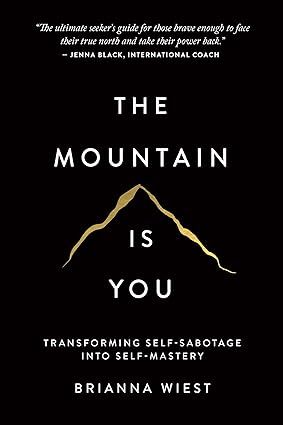
The Mountain Is You: Transforming Self-Sabotage Into Self-Mastery
4.7
-
18,286
$9.99
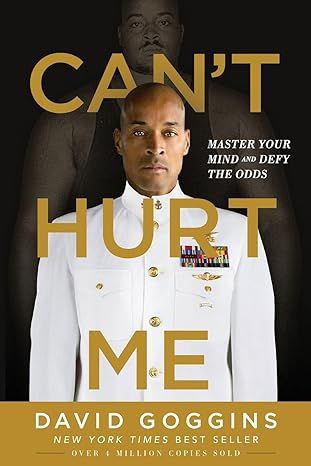
Can't Hurt Me: Master Your Mind and Defy the Odds
4.8
-
96,869
$9.99

Don't Believe Everything You Think: Why Your Thinking Is The Beginning & End Of Suffering
4.6
-
9,703
$4.99
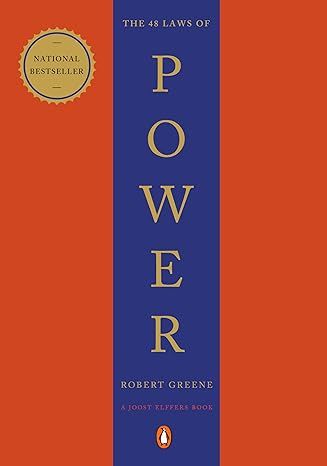
The 48 Laws of Power
4.7
-
76,985
$14.55
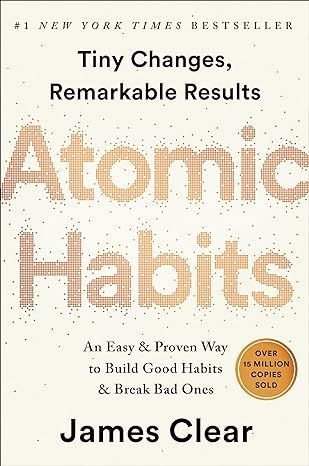
Atomic Habits: An Easy & Proven Way to Build Good Habits & Break Bad Ones
4.8
-
128,477
$13.79

The Lost Book of Herbal Remedies
4.7
-
19,060
$41.00
Best Sellers

The Great Alone: A Novel
4.6
-
152,447
$5.49

The Four Winds
4.6
-
156,242
$9.99

Winter Garden
4.6
-
72,838
$7.37

The Nightingale: A Novel
4.7
-
309,637
$8.61

Steve Jobs
4.7
-
24,596
$1.78

Iron Flame (The Empyrean, 2)
4.6
-
164,732
$14.99

A Court of Thorns and Roses Paperback Box Set (5 books) (A Court of Thorns and Roses, 9)
4.8
-
26,559
$37.99

Pretty Girls: A Novel
4.3
-
88,539
$3.67

The Bad Weather Friend
4.1
-
34,750
$12.78

Pucking Around: A Why Choose Hockey Romance (Jacksonville Rays Hockey)
4.3
-
41,599
$14.84

Start with Why: How Great Leaders Inspire Everyone to Take Action
4.6
-
37,152
$9.99

Tomorrow, and Tomorrow, and Tomorrow: A novel
4.4
-
95,875
$13.99

Weyward: A Novel
4.4
-
27,652
$11.99

Tom Lake: A Reese's Book Club Pick
4.3
-
37,302
$15.74

All the Sinners Bleed: A Novel
4.4
-
12,894
$13.55

The Mystery Guest: A Maid Novel (Molly the Maid)
4.3
-
9,844
$14.99

Bright Young Women: A Novel
4.2
-
8,485
$14.99

The Wager: A Tale of Shipwreck, Mutiny and Murder (Random House Large Print)
4.5
-
28,672
$14.99

Hello Beautiful (Oprah's Book Club): A Novel (Random House Large Print)
4.4
-
79,390
$14.99

Small Mercies: A Detective Mystery
4.5
-
16,923
$10.00

Holly
4.5
-
31,521
$14.99

The Covenant of Water (Oprah's Book Club)
4.6
-
69,712
$9.24

Wellness: A novel
4.1
-
3,708
$14.99

The Art Thief: A True Story of Love, Crime, and a Dangerous Obsession
4.3
-
4,805
$14.99
